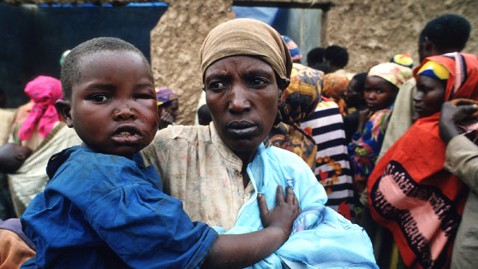Rwanda, and What Bill Clinton Left Out When He Criticized Obama on Syria

Image credit: Scott Peterson/Getty Images
Former President Bill Clinton reportedly expressed his support for U.S. intervention in Syria, while criticizing President Obama's inaction at a closed-press event at the McCain Institute on Tuesday according to news reports.
He cited his own leadership in the 1999 NATO intervention to end the conflict in Kosovo, which included the bombing of Serbian forces and strongholds of then-President Slobodan Milosevic.
"You just think how lame you'd be … suppose I had let a million people, two million people be refugees out of Kosovo, a couple hundred thousand people die, and they say, 'You could have stopped this by dropping a few bombs. Why didn't you do it?' And I say, 'Because the House of Representatives voted 75 percent against it?' " Clinton said according to audio of the event obtained by Politico and The Daily Beast . "You look like a total wuss, and you would be."
But under Clinton's watch there was another conflict, in 1994, in the tiny African nation of Rwanda, where millions of people did become refugees and 800,000 people were killed in less than two months.
Similar to Syria, there was a bi-partisan push by some Senators and human rights activists for the United States to take action and pressure the UN to help stop the bloodshed in Rwanda. But unlike Syria, which all experts agree is complex, advocates for intervention in Rwanda argued it wouldn't take much. The people doing the killing, the Hutus, did not have a sophisticated weapons system or a strong military. They were mostly young men roaming the streets and countryside, killing indiscriminately with machetes and small arms. The former UN Peacekeeper commander, Canadian General Romeo Dallaire, told the United Nations and the U.S. that he only needed 5,000 troops at most to end the atrocities and help the Tutsi rebels win.
Still, the Clinton administration made the calculation that the political cost of intervention, even asking the UN to authorize troops, would be too high. Just a year before the United States was involved in another intervention in an African country, Somalia, that had disastrous results after 18 troops were killed, the basis for the book and movie Black Hawk Down.
According to Samantha Power's Pulitzer Prize winning book "A Problem From Hell," about America's role in the world's most well-known genocides, Republican and Democrat Senators on the Senate Foreign Relations Committee wrote a letter to President Clinton asking him to request that the UN Security Council authorize sending troops to Rwanda. Power, a former human rights activist and journalist who President Obama has nominated to be the United States UN Ambassador, wrote that Senators were told by administration officials that there was no "base of public support for taking any action in Africa."
When President Clinton did finally respond to the letter, he defended the actions the U.S. had taken "ranging from paying for medical supplies to pressing for a cease-fire," Power wrote. Clinton told the Senators that he had spoken out about the killings and that the United States had "called for a full investigation of these atrocities."
By the time the Tutsi rebels had taken control of the country and ended the genocide less than two months after it began, 800,000 people had been killed and nearly two million refugees had fled to neighboring countries, primarily the Democratic Republic of Congo.
Former President Clinton has said many times in the years since that not intervening in Rwanda is his greatest regret. In March of this year he told CNBC that he believes had the U.S. gone into Rwanda, even marginally, early on in the genocide at least a third of the hundreds of thousands of people slaughtered could have been saved.
There are no reports that Clinton mentioned Rwanda during his speech at the McCain Institute event on Tuesday, but he reportedly had some advice for President Obama about letting public polls and Congress overly influence his foreign policy decision on Syria.
"If you refuse to act and you cause a calamity, the one thing you cannot say when all the eggs have been broken is, 'Oh my god, two years ago there was a poll that said 80 percent of you were against it.' You look like a total fool," he said.